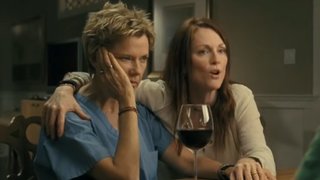Kids Are All Right's Oscar Nom Is The Result Of Indie Film Bias, And That's Not All Right

[ed. note: Mack kicks off our ongoing series of Oscar Rants with his take on The Kids Are All Right. Watch for more Oscar Rants coming soon. Here's Mack...]
I’m a prick. I’m an asshole, a cocksucker and a pretentious douche bag. I walked out of Spider-Man 2 and sat in my car until my friends were done watching it. I must have sighed at least forty times at the dialogue during Avatar. I own several Jim Jarmusch movies. I paid to see Woman Thou Art Loosed in the theater. I suck. I blame my father. When I was a kid we didn’t have any of the premium movie channels. I bitched and moaned constantly, but invariably, I received one of the following three responses. 1) They’re a waste of money. 2) You’re not old enough to have access to all those R-Rated movies. 3) (A long winded story about some dude my dad knew who couldn’t control himself and blew off work repeatedly because he couldn’t not finish a movie once he started watching it). I still don’t quite understand what the hell that third one had to do with me, but as a twelve year old with no net income, I was powerless against those first two complains. In protest, I began watching the Independent Film Channel. It was like an uncensored gift from the cable company.
Between the ages of 12 and 18, I watched a minimum of three or four IFC movies a week. From Boogie Nights to Breaking The Waves to the criminally underrated superhero movie The Shadow, I developed an almost encyclopedic knowledge of all things too-weird, perverse and fucked-up for the casual American moviegoer. In time, I started to take a strange pride in this. It was a chip on my shoulder. Oh, you watched Lords Of Dogtown last night? Well, I watched its origin documentary Dogtown And The Z-Boys, and by the way, it’s a far superior product. Just take a second to let the snobbery waft over you. Here’s the thing though, at some point, probably after I went to college and got real movie channels, I realized I was fucking insufferable. Worse yet, I realized I wasn’t any more right than the mouthbreathers who saw Transformers 2 a dozen times. Movies aren’t good simply because they’re gritty, independent and underseen, just like they don’t necessarily suck just because they were released by a studio or star Adam Sandler (The Wedding Singer owns). As much as it pisses me off that no one bothers to go out and see things like Buffalo 66, it pisses me off even more that critics and morons like my sixteen year old self elevate them a full point simply because they’re independent. No movie is a better example of that ill-functioning barometer than The Kids Are All Right.
Here’s the problem with most Hollywood movies: they go off the rails during the last 1/3rd, betray all of their characters and squeeze out an easily-digestible ending to satiate the casual movie fan. Here’s the problem with most independent movies: they amble around without any real direction before choosing a seemingly arbitrary point to conclude. At some point, movie critics got together and called bullshit on the Hollywood phenomenon, but the gaping independent hole is not only glossed over, it’s glorified, as if there’s some sort of poignancy in being directionless.
Skillfully written, superbly acted and oftentimes daring, The Kids Are All Right does a lot of things very well, but it also lacks focus, coherent plot and overall direction. Is this the story of two kids trying to connect with their sperm donor? If so, there’s no reason for them to disappear scene after scene as the innerworkings of Annette Bening and Julianne Moore’s troubled relationship usurps their quest for understanding. Or is The Kids Are All Right really a domesticated look at the partnership of those two women? If that’s the case, then the first twenty minutes of the movie shouldn’t go to great lengths to focus on the teenagers’ social problems. Then again, maybe the aim was to highlight all four as a family unit? This seems more likely, except if that’s really the objective, then viewers should get less Mark Ruffalo, especially the scenes involving him bedding employees at his restaurant. Any way you frame it, it’s still disorganized. Yet, here we are, celebrating it as one of the ten best movies of the year. It may not be deserving, but it’s certainly not surprising. Here’s how we got there.
Every year hundreds of independent movies are produced. Almost all of them are conceived, reared, distributed and put out to pasture in near obscurity. I don’t have any figures on this, but let’s say eighty percent follow that trajectory. That leaves twenty percent of independents that find some form of distribution. This can happen for any one of three reasons. 1) It’s really good. 2) It stars big name actors. 3) It has easily sellable or controversial subject matter. Most of the twenty percent contain one of these reasons. Take for example Winter’s Bone. That movie was really fucking good. Therefore, after winning the Grand Jury Prize at Sundance, Roadside Attractions rolled it out in various art house theaters across the country. Every year though, there’s one or two independent movies that somehow nail all three of those distribution reasons. The Kids Are All Right is really good. It stars Annette Bening, Julianne Moore and Mark Ruffalo. It’s also about a lesbian couple and their children searching for a sperm donor. Whenever that happens, commentators start openly speculating on the film’s Oscar potential months in advance. Why? Because it has the independent film Academy Award pedigree. On paper, it looks like it was made simply for winning awards. The same logic applies with The Reader. 1) It’s really good. 2) It stars Kate Winslet. 3) It’s about a Nazi.

Now, I wouldn’t dare accuse director Lisa Cholodenko’s almost decade long labor of love of being simply contrived to please Oscar voters, nor would I slander The Reader with the same complaints. But both of these films, without question, look like Academy Award films from a distance. As we know, perception is at least half the battle, but when they’re examined closely on their merits, they’re really not good enough to be honored. The Reader is slow and arduous to get through. It miserably cops out at the end by not overtly showing the main character’s suicide, and if I had to guess, I would bet almost no one is still watching this film. There’s a fundamental disconnect between how good it should be (5/5) and how good it actually is (4/5). So too do we find that disconnect in The Kids Are All Right (5/5 vs 4/5). Frankly, the sum adds up to a lot less than the parts. Yes, Annette Bening is amazing. Yes, Mark Ruffalo is equally brilliant and Julianne Moore is pretty damn good. Yes, the director is passionate with her subject matter, interested in details and succeeds in telling a worthwhile story, but there are more than just a few simple issues with this film, even beyond the lack of direction I explored earlier.
CINEMABLEND NEWSLETTER
Your Daily Blend of Entertainment News
All of the kids’ friends are improperly used. They need to be around more or less. As is, they only hint at the emotional troubles each child is going through. Mark Ruffalo’s job is completely unbelievable. How a man of such limited intelligence and lack of common sense could parlay his muted skill set into a lucrative business is anyone’s guess. The escalating porn volume scene is stupid and out of place, a misguided attempt at comedy that feels apart from the rest of the film. And perhaps worse of all, there is not one single scene in The Kids Are All Right that’s truly brilliant. The film comes close once, when Annette Bening zones out for dinner, but this is surpassed by individual moments in at least twenty other films released last year. Let’s for a second pretend we’re buddies, and you came to me and said you just watched (insert any of the Best Picture nominees save The Kids Are All Right). My response would be as follows: "Holy Shit! How awesome was the Henley sequence in The Social Network?" Or "Did you cry when Andy made his decision at the end of Toy Story 3?" Or, "did you breathe once during the final Black Swan performance?" "Wasn’t that crazy when the cop pulled over Teardrop?" You know what I would say about The Kids Are All Right? "That was a pretty good movie, wasn’t it?"
I’m a stiff neck, a haughty, arrogant ass that actually owns a film named Julian Donkey-Boy. Then again, I also own two copies of Grandma’s Boy. One is a special edition and the other came in a two pack with Borat. It’s against my better judgment. Certainly, a younger version of myself likely would have bitchslapped me for such an offense, but growing up is about admitting when you were off base. For years, I engaged in independent film bias. I equated risky subject matter and daring performances with quality, when really, that’s just one element in a larger equation. The Kids Are All Right is full of chance-taking and balls-to-the-wall performances, but it also lacks direction and momentary brilliance. I would recommend it to anyone. It’s a damn fine movie, but that doesn’t mean it’s Oscar-worthy. Anyone who tells you otherwise has an indie film bias. Take it from someone who knows.
Author’s Note: For the record, I approve of Bening and Ruffalo’s nominations, just not the film’s nomination for Best Picture.
[Watch for more Cinema Blend Oscar Rants coming later this week right here.]
Mack Rawden is the Editor-In-Chief of CinemaBlend. He first started working at the publication as a writer back in 2007 and has held various jobs at the site in the time since including Managing Editor, Pop Culture Editor and Staff Writer. He now splits his time between working on CinemaBlend’s user experience, helping to plan the site’s editorial direction and writing passionate articles about niche entertainment topics he’s into. He graduated from Indiana University with a degree in English (go Hoosiers!) and has been interviewed and quoted in a variety of publications including Digiday. Enthusiastic about Clue, case-of-the-week mysteries, a great wrestling promo and cookies at Disney World. Less enthusiastic about the pricing structure of cable, loud noises and Tuesdays.
Most Popular





